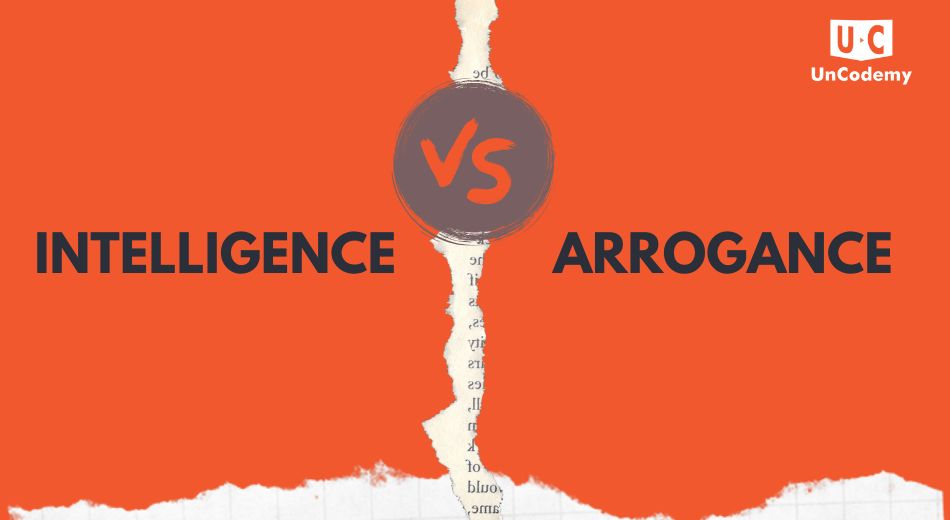Intelligence vs Arrogance: Key Differences Explained

- arrogance
- emotional intelligence
- humility
- intelligence
- leadership
- mindset
- personal growth
- self-awareness
- self-improvement
What is Intelligence?
Intelligence, in its simplest form, refers to the ability to acquire and apply knowledge and skills. It’s about thinking critically, problem-solving, learning from experiences, and adapting to new situations. Intelligent individuals tend to show curiosity, humility, and a desire to improve themselves. They recognize that their understanding is limited, which motivates them to seek out more knowledge.
Intelligent people are often open to constructive criticism, and they engage in self-reflection. They don’t shy away from admitting when they don’t know something; instead, they take it as an opportunity to learn and grow. This mindset fosters continuous development and improvement, making intelligence an enduring trait that helps individuals succeed in both personal and professional settings.
What is Arrogance?
Arrogance, on the other hand, is a trait rooted in an inflated sense of one’s abilities or knowledge. Arrogant people believe they are superior to others and often express this belief through dismissiveness, condescension, or a lack of empathy. They may be highly skilled or knowledgeable in a particular area, but they tend to act as though they are infallible or beyond reproach.
Unlike intelligence, which encourages growth and learning, arrogance often stifles it. Arrogant individuals are less likely to accept feedback or criticism because they feel their opinions and abilities are unquestionable. This can create barriers in relationships, both personal and professional, and can ultimately hinder their development.
Key Differences Between Intelligence and Arrogance
- Humility vs. Hubris
- A truly intelligent person accepts they don’t know everything. They’re humble, always ready to learn, and open to others’ ideas. This openness is what helps them grow over time.
- Arrogant people, on the other hand, act like they have all the answers. They ignore advice and feedback, thinking they’re always right—this blocks their growth in the long run.
- Confidence vs. Overconfidence
- Confidence means knowing your strengths without showing off. Intelligent individuals let their work speak for itself and maintain composure even when challenged.
- Overconfidence comes with a sense of superiority. Arrogant individuals often exaggerate their abilities and tend to overshadow others to feel more important.
- Curiosity vs. Dismissiveness
- Intelligence leads to curiosity—always asking questions, exploring new ideas, and learning from every experience. Curious minds grow stronger over time.
- Arrogance kills curiosity. Arrogant people often shut down others’ viewpoints and assume their perspective is the only one that matters.
- Empathy vs. Disdain
- Empathetic individuals can put themselves in others’ shoes. They listen, connect emotionally, and respect differing opinions—a sign of true intelligence.
- Arrogant people usually lack empathy. They look down on others and often fail to appreciate different backgrounds, perspectives, or emotions.
Why Do People Confuse Intelligence with Arrogance?
One of the main reasons intelligence and arrogance are often confused is that intelligent people, particularly those who excel in specific areas, can come across as aloof or overly confident. In social situations or workplaces, a person with vast knowledge or expertise might unintentionally give off an air of superiority, leading others to perceive them as arrogant.
Additionally, certain environments—like academia or corporate settings—reward high achievers and the appearance of certainty, which can sometimes mask underlying humility. When someone demonstrates a high level of competence, others might interpret it as arrogance, especially if it’s accompanied by assertive behavior.
How to Avoid Crossing the Line from Intelligence to Arrogance
- Practice Active Listening:
One of the best ways to prevent arrogance is to actively listen to others. Acknowledge their thoughts, opinions, and experiences. This shows that you value their perspectives and are open to learning from them. - Admit When You Don’t Know Something:
No one knows everything, and intelligent people understand this. Admitting when you don’t have an answer demonstrates humility and a willingness to grow, helping to keep arrogance in check. - Be Mindful of Your Tone and Body Language:
Sometimes it’s not what you say, but how you say it. Avoid sounding condescending or dismissive in your speech and gestures. A respectful tone can significantly change how your message is received. - Celebrate the Success of Others:
True intelligence lies in lifting others up. Recognizing and appreciating others’ accomplishments reflects emotional maturity and helps you stay grounded in humility. - Seek Constructive Feedback:
Intelligence thrives on feedback, while arrogance resists it. Make it a habit to welcome feedback—personally and professionally. It helps refine your skills and promotes self-awareness.
Conclusion: Embracing True Intelligence with Humility
In the end, the true measure of intelligence isn’t how much you know, but how willing you are to grow and learn. Arrogance, on the other hand, is a trait that prevents growth, stifles collaboration, and isolates individuals from others. By embracing humility, listening actively, and remaining open to new ideas, you can avoid the pitfalls of arrogance and cultivate intelligence that makes a lasting positive impact.
In the pursuit of wisdom, remember that arrogance is often rooted in insecurity. True intelligence, however, is based on a deep understanding that we all have something valuable to contribute—and that no one, no matter how knowledgeable, has all the answers.


























